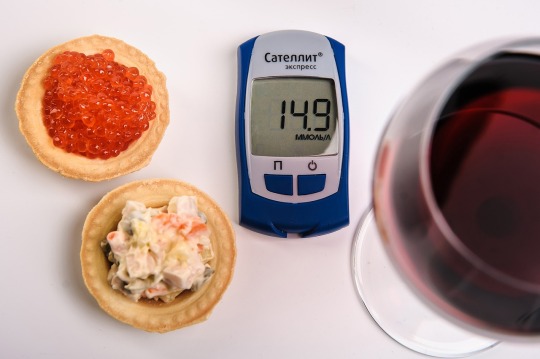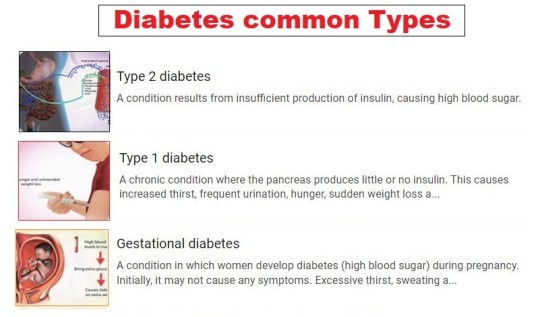#diabetes complications
Text
waking up to a CGM low blood sugar alarm going off as a t1d without a pancreas is honestly terrifying. i try to remain calm and just treat the low, but i always think "what if this has been the time when the CGM wasn't working and i just never woke up?"
i am working on trying to reframe that thought process, but like, it's only been eight months since I got my pancreas removed, and less than three on my insulin pump... i'm hoping this ends up just being the kind of thing that takes time and i will eventually get less terrified.
11 notes
·
View notes
Text
#carbohydrates#diabetic friendly#diabetes mellitus#health#diabetic neuropathy#diabetes complications#healthy diet#sugarcontrol#type 2 diabetes
0 notes
Text
Diabetes in Young Adults: Causes and Solutions
Addressing the rise of diabetes in young adults requires comprehensive strategies that promote healthy lifestyle choices, including regular physical activity, balanced nutrition, stress management, and increased awareness of diabetes risk factors.
Additionally, early detection through regular screenings and improved access to healthcare can help identify and manage diabetes at an earlier stage,…

View On WordPress
#blood sugar control#blood sugar monitoring#diabetes#diabetes advocacy#diabetes awareness#diabetes community#diabetes complications#diabetes counseling#diabetes diagnosis#diabetes education#diabetes in adolescents#diabetes lifestyle#diabetes management#diabetes medications#diabetes prevention#diabetes research#diabetes resources#diabetes risk factors#diabetes support#diabetes symptoms#diabetes technology#diabetes treatment#exercise for diabetes#family history of diabetes#gestational diabetes#glucose metabolism#glucose monitoring#healthy diet#healthy habits#healthy lifestyle
0 notes
Text
#Type 2 diabetes reversal#Gestational diabetes management#Diabetes medication#Diabetic-friendly recipes#Exercise for diabetes#Diabetes and weight loss#Managing diabetes without medication#Monitoring glucose levels#Diabetes complications#Herbal remedies for diabetes#Reverse diabetes naturally
0 notes
Text
#type 2 diabetes#diabetes causes#diabetes symptoms#diabetes prevention#how to prevent diabetes#diabetes complications
1 note
·
View note
Text
Diabetic Sores on Legs: A Comprehensive Exploration of Complications and Treatments
Discover in-depth insights into the complexities of diabetic sores on legs, also known as diabetic ulcers, and foot-related complications associated with diabetes. Unravel the multifaceted causes, symptoms, and highly effective treatment approaches meticulously detailed in this all-encompassing article on diabetic wound care, prevention, and management.
Introduction
The global impact of…

View On WordPress
#amputation prevention#blood sugar management#chronic wounds#Diabetes#Diabetes complications#diabetic wounds#Foot ulcers#glycemic control#Healthcare provider#hyperglycemia#infection prevention#medical care#neuropathy#patient education#pressure sores#skin care#ulcer treatment#vascular disease#wound care#wound healing
0 notes
Text
Diabetes Types
In fact, causes of diabetes could vary according to the type, which’s the same case for ways of treatment. There are two main types of diabetes, yet, two more types could be added to the list, with a possible temporary one, as you’ll see through the following.
Diabetes Type1:
This type hits the immunity system, leading to pancreas cell damage, the insulin factory in our bodies.
Insulin job rolls around containing sugar amounts and makes it able to be absorbed by different body cells.
Medicine and science are still unsure about the causes of diabetes type 1, but we know that it could have some heritage and genetic reasons based, as we’ll spread later.
Diabetes Type2:
This type comes due to some resistance against insulin efficiency, leading to sugar or glucose accumulation throughout the bloodstream, affecting, in its turn, the blood circulation efficiency and how it serves power to body cells. This type is responsible for 90 to 95% of diabetic patients worldwide.
Diabetes Type 1.5:
As funny as it sounds, yet it’s a severe type, which gains its name from how it could be described.
Type 1.5 is something between both type 1 and type 2. It’s similar to type 1 regarding how it works, as it leads immunity cells to attack pancreas cells, though it turns out to be type 2 by aging.
In fact, this type can not be controlled by just converting to a healthier lifestyle and meals. Still, it asks for different types of medicines and outer insulin intake according to the diagnosis and doctor’s prescription.
to know more about diabetes visit this link :
https://7keema.com/causes-of-diabetes-facing-you-daily/
#diabetes#diabetic#type 1 diabetes#type 2 diabetes#type 2 diabetic#home care#diabetes symptoms#diabetes management#diabetes complications
0 notes
Text
About the WHO Global Diabetes Compact Forum.
The WHO Global Diabetes Compact Forum was established to share and disseminate ideas, information and views that help advocate for the vision the Global Diabetes Compact: a world where the risk of diabetes is reduced and where all people who are diagnosed with diabetes have access to equitable, comprehensive, affordable and quality treatment and care. Collaboration and cooperation between Forum members and WHO are key objectives of the Forum.

#Forum#World Health Organization (WHO)#diabetes mellitus#diabetes care#diabetes control#diabetes complications
0 notes
Text
gastroparesis, my beloathed
#nothing like some nausea with a side of gagging#throw in some inability to eat#sprinkle that feeling of being too full#a dash of heartburn#just a smidge of bloating and abdominal pain#katie speaks#chronic illness#diabetes complications
2 notes
·
View notes
Text
#leg cramps#diabetes#health#nerve damage#diabetic friendly#diabetic neuropathy#neuropathy#foot pain#diabetes complications#pregnancy#legs
0 notes
Text
Diabetes Types, symptoms, complications and management
Diabetes Types, symptoms, complications and management
Diabetes is a metabolic disorder characterized by high sugar levels for long periods, where patients experience frequent urination, excessive thirst or hunger, and weight changes. It is caused by inadequate production of insulin, or insulin resistance. It can be managed by lifestyle changes , medication and insulin. Diabetes is recognized as the world’s fastest growing chronic…

View On WordPress
0 notes
Text
#Diabetes management#Diabetes treatment#How to control diabetes#Diabetes diet#Blood sugar control#Insulin therapy#Natural remedies for diabetes#Diabetes prevention#Lowering blood sugar levels#Type 2 diabetes reversal#Gestational diabetes management#Diabetes medication#Diabetic-friendly recipes#Exercise for diabetes#Diabetes and weight loss#Managing diabetes without medication#Monitoring glucose levels#Diabetes complications#Herbal remedies for diabetes#Reverse diabetes naturally
0 notes
Text
working on the daunting task of having an earlier bedtime and rising time
#WEIGHT BULLSHIT DISCUSSION AHEAD❗❗❗#i gained weight lately and it overall doesnt bother besides the practicality of slightly tighter clothing#but me family!!! its all over me!!#and my tests came back a bit wack#i do understand it since my family has a lot of weight troubles related trauma#grandpa died from complications from being diabetic (miss u everyday tata) and some of my aunts cant walk because of their weight#but like bro i walk ~10000 steps everyday so its not like im a sedentary person#anyway. gotta wake up earlier to begin my day exercising#after all i am A Science Guy and all the studies point to that the 7 am exercising is better for the metabolism#eating healthy is not exactly the problem. my diet is very varied!#i just love eating lmao#anyway wish me luck!#the only bad thing about all this is that my art time is gonna be less... gotta reduce my screen time for this to work
27 notes
·
View notes
Text
actually diabetes is never "badly managed" or "poorly controlled" because blood sugar readings don't hold moral worth.
#instead 'effects of badly managed diabetes'#just say 'effects of long periods of hyperglycaemia' (or hypoglycaemia but usually people are talking about effects of high blood sugar not#low blood sugar. or if you're talking about a combination of highs and lows say 'effects of unstable blood sugar'#too much moral judgment is placed of diabetics ability to function as alpha/beta cells#(usually people attribute diabetes stuff to the pancreas but it's actually beta cells that produce insulin. the pancreas produces the beta#cells which produce the insulin. in type one diabetes the immune system attacks the beta cells (and the alpha cells#they do glucogon stuff if i remember correctly)#(that was a tangent. yes diabetes is related to the pancreas but also. more complicated than 'my pancreas is Dead'#the pancreas actually has more roles than just insulin/blood sugar stuff.)#anyways. feel free to reblog#🫧#☁️#diabetes#type one diabetes#t1d#this also applies to type two. just i don't have that so i feel weird tagging it djfjkfk#cripple punk#cpunk#disability#ableism tw
78 notes
·
View notes
Text
Diabetic Sores on Legs and Related Conditions: A Comprehensive Exploration
Diabetes, a pervasive and enduring medical condition affecting millions of individuals globally, presents a constellation of complex complications. Among these, diabetic sores on legs, colloquially known as diabetic foot ulcers, stand out as a formidable challenge. The genesis of these sores intertwines with multifarious factors, encompassing compromised blood circulation, neuropathy-induced…

View On WordPress
#amputation prevention#blood sugar management#chronic wounds#Diabetes#Diabetes complications#diabetic wounds#Foot ulcers#glycemic control#Healthcare provider#hyperglycemia#infection prevention#medical care#neuropathy#patient education#pressure sores#skin care#ulcer treatment#vascular disease#wound care#wound healing
0 notes
Link
Do diabetes and its diabetes health-related complications scare you?
How does this fear affect your life and daily self-care, and more importantly, what do you do about it?
Small amounts of fear might energize you and get you to pay attention, but the threat has to seem manageable. If there's nothing you can do, and the future looks too awful, you will tend to give up and try to enjoy the time you have left.
Of course, some fear of diabetes is justified. The complications of diabetes are terrifying. So are the effects it can have on your family and your finances. Fears are stressful, and stress isn't good for diabetes. Fear increases insulin resistance and blood pressure and interferes with the body's natural healing systems. It makes it harder to enjoy life.
So what do we do about it?
I think by taking better care of ourselves we can reduce our stress and even feel better about our diabetes lives.
#Diabetes#type 2 diabetes#type 1 diabetes#fear#health fears#health scare#complications#diabetes complications#podcast#podcasts#podcasting#podcaster#mr divabetic#divabetic
0 notes